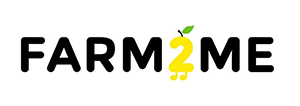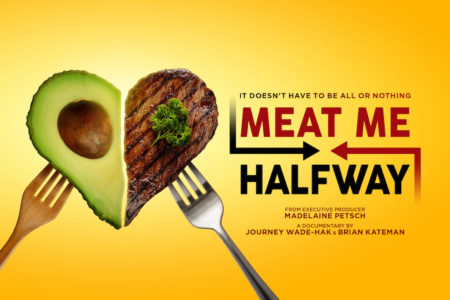Originally published by Jill Ettinger (Green Queen)
There is no shortage of watershed moments in the new documentary Meat Me Halfway, produced by and starring Reducetarian Foundation founder, Brian Kateman. He steps hesitantly into the complicated relationship we have with animals as food, looking at it from all possible angles—from taste and traditions, convenience and cost, to animal sentience and suffering, and to the looming climate crisis and how it’s impacted by livestock production. It’s meaty stuff indeed—the reason his organization is focused on reducing meat consumption in the first place rather than eliminating it. And this is perhaps most evidenced in the early moments of the film where Kateman is seated at a table in his parents’ Staten Island home. It’s soon revealed that neither of his parents can recall having ever eaten an avocado, let alone considered the possibility of consuming less meat. A tub of guacamole appears, and there, the case for simply normalizing the concept of replacing meat sometimes becomes ever more urgent.
It’s not that Kateman’s parents are “pro” meat. They’re not likely to troll vegans on social media, queuing up the “bacon though” comments. Their approach to food teeters on the agnostic, a complacency based on cultural and familial traditions as much as geography: they eat what they’ve always eaten and what their local supermarkets and restaurants offer. Despite having a son who went vegetarian at a relatively young age, the Katemans looked at Brian’s choices more as generational, something those crazy Millennials do, not a lifestyle option necessitated by health, ethics, or the climate crises.
The climate change dilemma
In this line of thinking, the Katemans are like most Americans, if not most people on the planet. Kateman’s father, Russell, touches on this a few times, speaking to the need to take care of his own family first, his small bubble is all he can worry about. The world will manage by itself —“it’s in god’s hands.” The rest of us merely need to learn to dress appropriately for the increasingly dramatic weather changes, a sentiment that he, and millions of others, conflate with the changing climate. And while temperatures and weather events are showing the more immediate impact of global warming, they’re the smoke triggering the detector—there’s still a fire moving in, ready to melt it all into ash.
Kateman anchors the film around this line of thinking. He moves through the stickiness of our food system almost as if through his parents’ eyes. He steps into slaughterhouses and food tech labs with a genuine curiosity and a refreshing openness. Is Kateman really looking for answers? Or is he just getting the lay of the land here, first? Most people don’t question where their food comes from. Kateman is compelled to nudge the door open here, simply by asking all of the questions most of us aren’t thinking about: Do we need meat? Why do we like meat? Is meat bad for us? The planet? Is it ethical? What alternatives are there? Are they really any better for us or the planet?
Where Kateman is steadfast, though, is in his belief that the planet is heating up. There’s science to prove this, of course. And 350.org founder, environmentalist Bill McKibben, articulates this at the film’s onset. McKibben says diet is “one of those places where change is possible.” The energy and transportation sectors are indeed driving a bulk of the emissions causing global warming, but agriculture is not far behind. Some numbers put its impact, particularly from livestock, at significantly higher than its current 18-24 percent. But most notably, according to McKibben, it’s the one thing we can change, right now, literally at our next meal. Choosing plants instead of animals is simple, and much easier than shifting a whole country—let alone a whole planet—toward cleaner, more efficient energy and transport.

The food system
This is why the conversation about meat is so important and so tricky. Kateman, and the experts in the film, which include author and NYU professor Marion Nestle, food attorney and founder of the Plant Based Foods Association, Michele Simon, as well as food journalist Mark Bittman, and New York City’s current mayoral front-runner, Brooklyn Borough President, Eric Adams.
They’re all aligned in the belief that our food system isn’t working, and is headed toward a collapse. Adams doesn’t mince words. He likens the current food landscape to apartheid, with many inner-city communities stranded in “food deserts”—areas without easy access to supermarkets or farmers’ markets, making poor food choices, typically meat-heavy fast-food, the default. Affluent neighborhoods have, on average, twice as many supermarkets as poorer neighborhoods, even if populations are lower in those affluent areas.
Yet, in just the last five years, vegan meat options like the Beyond and Impossible burgers have become almost ubiquitous, appearing in fast-food restaurants and supermarkets across the country—and ticking toward price parity with meat. But meat consumption is on the rise—more than 225 pounds of it is consumed per person per year in the U.S. alone, up from 200 pounds a few years ago.

Is eating animals ethical?
Kateman explores the moral dilemma of eating animals, too. He speaks with experts and animal rights activists. He doesn’t identify as an activist, but in a gripping moment outside a slaughterhouse in Los Angeles, Kateman watches tearfully as pigs arrive in trucks, waiting to die. Actor Joaquin Phoenix put the vigils on the map when he rushed off from his 2020 Screen Actors Guild Award for Best Actor in Joker to attend a pig vigil, still sporting his Stella McCartney tux.
As Kateman struggles to look on while activists provide water and comfort to the animals in the trucks, there’s an audible scream from inside one of the vehicles—a foreshadowing of the horror that’s about to take place once the animals are moved from the trucks to the slaughter line.
Meat Me Halfway veers from the pack of vegan-centric dietary documentaries here, like 2017’s What the Health and 2019’s Game Changers. Kateman, much like Jonathan Safran Foer in his 2009 book Eating Animals and the Natalie Portman narrated 2017 film of the same name, isn’t out to make the case against animals as food. Like his father, he respectfully embraces and defends the individual journey and right to personal choice. But he’s not making the case for eating animals, either. He’s not entirely convinced there is an easy answer. Wouldn’t we have found it by now if there had been? As he stands with farmer Will Harris at White Oak Farm in Georgia, surrounded by White Oak’s free-range animals living better and with more space than most urbanites, it’s hard not to wonder if some meat is, in fact, not terrible.
But it’s an ouroboros mental exercise. Once inside the White Oak slaughterhouse, a blood-soaked floor and carved-up carcasses don’t look any different than the results of animals produced in factory farms. It’s here where Kateman confronts one of the biggest challenges with meat consumption: all other issues aside, is it ever ethical?

The future of meat
From here, the film follows much of the trajectory of its most recent predecessor, Netflix’s Seaspiracy, which dived into the fishing industries, in exploring the alternatives to animals for food. Kateman takes the viewer into the future of meat, where technology, like cell-based, is growing “real” animal meat in labs, and turning plants into “bleeding” protein-rich burgers is done in ways that are a lot less sci-fi than they sound. Most foods we eat these days that come in boxes, bags, or bottles, were developed by white lab-coat-wearing scientists and produced in factories. This is the nature of modern food production—and protein is no different.
While Kateman’s worldview may still differ from that of his parents and the larger population, his father eventually comes around. By the end of the film, health issues have pushed him to drop weight. He does this by eating less meat and embracing broccoli. But there are worse things, he realizes, than reducing meat. No matter what the reason, turns out it’s actually pretty easy.
Meat Me Halfway is streaming now. Visit the website for details.



